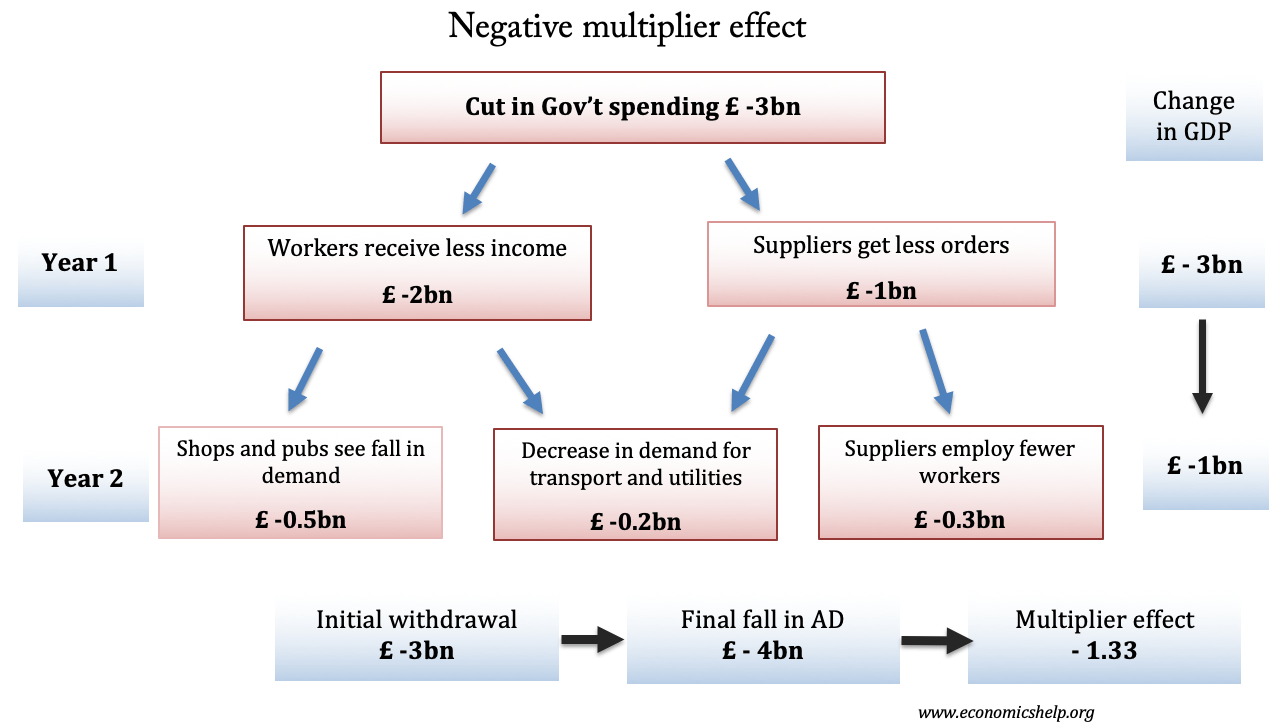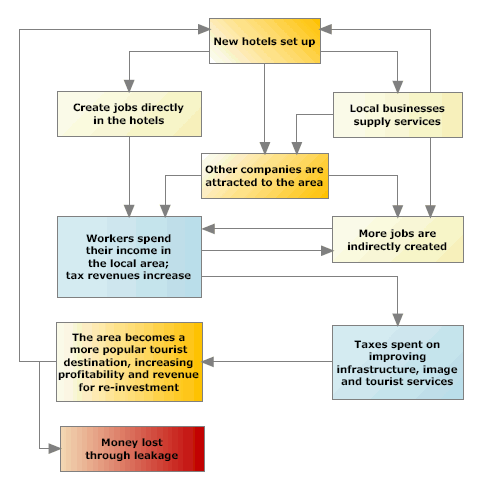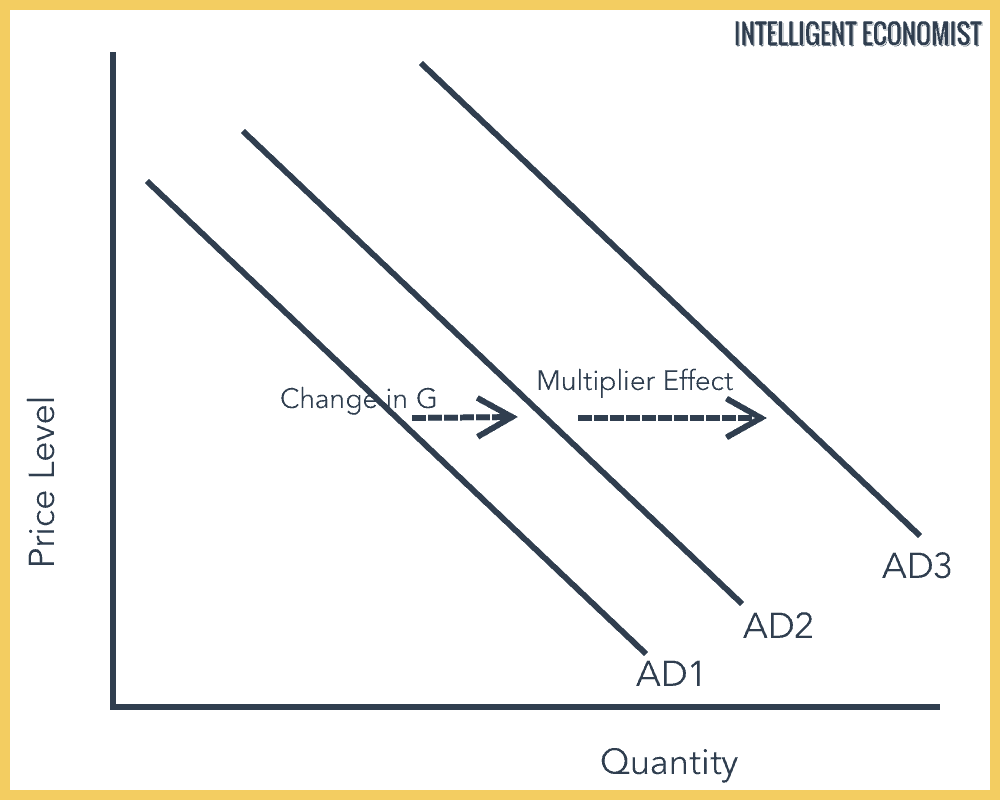In your own words please list two incentives and describe their impacts. The size of the multiplier effect depends on the percentage of deposits that banks are required to hold as reserves.

The Multiplier Effect Definition Example And Formula Boycewire
Final change in real GDP Initial change in AD.

. A multiplier refers to an economic factor that when applied amplifies the effect of some other outcome. A recessionary gap with an equilibrium of 700 potential GDP of 800 the slope of the aggregate expenditure function AE 0 determined by the assumptions that taxes are 30 of income savings are 01 of after-tax income and imports are 01 of before. This is largely fuelled by the growth in the tourism industry and associated industries that grow as a result of tourism.
In your own words please list two. Multipliers are leaders who look beyond their own genius and focus their energy on extracting and extending the genius of others says Elise. The multiplier effect is also visible on the Keynesian cross diagram.
The larger the MPC the smaller the multiplier. According to Haggett 2001 p789 Multiplier effect is a term used in systems thinking to describe the process by which changes in one field of human activity subsystem sometimes act to promote changes in other fields subsystems and in turn act on the original subsystem itself. The multiplier effect is a concept in economics that describes how an injection into an economy such as an increase in government spending creates a ripple effect which increases employment and the output of goods and services in the economy.
If the multiplier is 10 and income increases by. Look it up now. Describe the multiplier effect in your own words.
The term is generally used in reference to how much a certain amount of expenditure increases. Definition of multiplier effect. For example tourism in an area will create jobs in an area therefore the employees of the tourism industry will have some extra money to spend on other services and therefore improving these other services in that area allowing.
The multiplier makes the economy less sensitive to changes in autonomous expenditure. The multiplier arises because a given initial change in spending changes the incomes of producers. The Multiplier Effect.
The multiplier effect refers to the increase in final income arising from any new injection of spending. The tourism multiplier effect occurs when the economic benefits of tourism are multiplied. Summarise the ways that fiscal policy has affected our country since world war II.
For example tourism in an area will create jobs in an area therefore the employees of the tourism industry will have some extra money to spend on other services and therefore. In the economy there is a circular flow of income and spending. The size of the multiplier depends upon households marginal decisions to spend called the marginal propensity to consume mpc or to save called the marginal propensity to save mps.
A multiplier value of 2x would therefore have the result of doubling some effect. Multipliers get more done by leveraging using more of the intelligence and capabilities of the people around them. Figure B11 shows the example we have been discussing.
This injection of demand might come for example from a rise in exports investment or government spending. 4 marks EXAMPLE The multiplier otherwise known as the income-expenditure multiplier is the effect of a one-unit increase in exogenous expenditure on short-run equilibrium output. It is important to remember that when income is spent this spending.
The Multiplier Effect Research. The multiplier effect tends to magnify small changes in spending into much larger changes in real Gross Domestic Product GDP. It can bring wide-reaching benefits to people involved directly and indirectly with the tourism industry.
The effect of a relatively minor factor in precipitating a great change especially. A multiplier or the multiplier effect is the factor by which the return resulting from an expenditure is greater than the expenditure itself or the way in which a change in spending leads to an even bigger change in income. These are not feel good leaders.
The multiplier is the ratio of the change in spending to the change in GDP. The term multiplier effect refers to the resulting effect of a service or amenity creating further wealth or positive effects in an area. The multiplier coefficient itself is found by.
Money that is earned flows from one person to another and most of it gets spent. The multiplier effect occurs when an initial injection into the circular flow causes a bigger final increase in real national income. Definition of multiplier effect An effect in economics in which an increase in spending produces an increase in national income and consumption greater than the initial amount spent.
Definition of Multiplier Effect The expansion of a countrys money supply that results from banks being able to lend. The effect of a relatively small change in one economic factor such as rate of saving or level of consumer credit in inducing a disproportionate increase or decrease in another such as gross national product. - Supply-side fiscal policy is designed to provide incentives to producers to increase aggregate supply.
Economics - please describe Spending Multiplier Effect and give an how it is affected by peoples savings habits. The multiplier effect is the idea that for every dollar that the government spends more than one dollar in economic activity is created.

Negative Multiplier Effect Economics Help



0 Comments